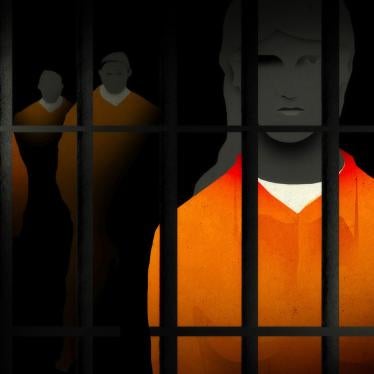In Algerian President Abdelaziz Bouteflika address to the nation on April 30, he announced that he intends to establish an independent national commission of inquiry to investigate the causes of recent violence in the Kabylie region. He said that the commission would be charged with determining all the facts "in complete freedom and total transparency."
Such an initiative is badly needed, in our view, and we commend you for taking it. At the same time, we note the great skepticism of many Algerians that such a commission will serve to uncover the truth or to address the crisis underlying these disturbances. As you know, the reports of the commissions on the assassination of President Boudiaf in 1992 and the massacre in Serkadji prison in 1995 were widely criticized for failing to identify all those responsible for these killings, while the findings of the commission looking into allegations of fraud in the 1997 nationwide municipal elections were never made public.
The credibility of your government as you confront this crisis thus depends heavily on the steps you take to ensure that this commission is empowered to discover the facts, make them public, and identify those persons, including government officials, responsible for criminal wrongdoing. The work of the commission should include meetings at which the public is invited to testify concerning allegations of wrongdoing.
According to news reports, law professor Mohand Issad will head the commission. Your remarks of April 30 left uncertain the composition of the commission, beyond stating that it would include "representatives of civil society." We urge you to ensure that persons appointed to the special commission enjoy, without exception, unchallenged reputations for independence, competence, integrity, and impartiality. Their number must also include persons who have proven familiarity with and expertise in human rights law as well as Algerian law, and with international law enforcement standards.
The special commission must be given the resources and authority, including subpoena powers, necessary to carry out an impartial and effective investigation. It is crucial that the government set up the commission promptly so that it can begin its investigation immediately. We urge you to define more concretely the scope of this investigation, to ensure that the commission makes violations of human rights by security forces, as well as violations of law by rioters, among its very top priorities.
The commission's mandate must therefore include the circumstances surrounding the death in custody of secondary-school student Massinissah Guermah on April 18, and the use of lethal force by the security forces in confronting and putting down the demonstrations and riots that followed. International law enforcement standards are clear that lethal force should only be used when strictly unavoidable in order to protect life. We strongly recommend that the commission's terms of reference include the U.N. Basic Principles on the Use of Force and Firearms by Law Enforcement Officials as well as the United Nations Principles on the Effective Prevention and Investigation of Extra-legal, Arbitrary, and Summary Executions. Those principles specify that independent investigations into suspicious deaths should include opportunities for the public to testify and autopsies by physicians with forensic expertise, and that the findings of the commission be made public.
In your April 30 remarks, you stated that the commission's activities "will have no bearing whatsoever on the outcome of the judicial investigations which prosecution offices may decide to carry out." What is essential is that the special commission and the office of the prosecutor, between them, exercise the responsibility of the government to identify publicly and bring to justice those persons responsible for serious violations of law, including violations of international human rights treaty law to which Algeria is party, and referring them to judicial proceedings that meet international fair trial standards.
We understand that the National Assembly has recently adopted a resolution to set up its own commission of inquiry into the same events. We recommend in addition that the government grant access to Algerian as well as international human rights organizations wishing to conduct investigations into these incidents. Such a step will greatly enhance the credibility of the national commission.
In that regard we note that Human Rights Watch has not yet received a response to our request, first made in a December 2000 letter to your excellency, to visit the country. We would welcome such an invitation, and look forward to your government's positive response.
Sincerely,
/s/
Hanny Megally
Executive Director
Middle East and North Africa Division
Human Rights Watch







